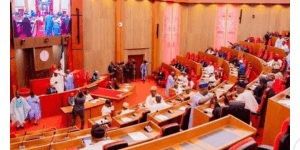Senate Backs Tinubu’s State of Emergency in Rivers
* Legality and Implications
In a significant development, the Nigerian Senate on Thursday approved the state of emergency declared in Rivers State by President Bola Tinubu. This decision came after a closed-door session where lawmakers deliberated on the emergency proclamation, which also resulted in the suspension of Governor Siminalayi Fubara, his deputy, Ngozi Odu, and other elected officials.
How It Started: Tinubu’s Letter to the Senate
The Senate’s deliberation followed a letter from President Tinubu, which was read at the plenary by Senate President Godswill Akpabio. The letter outlined the rationale behind the emergency rule, citing threats to peace and governance in Rivers State. To discuss the matter privately, Senate Leader Opeyemi Bamidele invoked Order 135 of the Senate rules, leading to a closed session. The motion was seconded by Minority Leader Abba Moro, and the Senate later gave its approval.
Legal and Political Questions
The Senate’s endorsement of Tinubu’s decision raises serious legal and political questions. While Section 305 of the 1999 Constitution allows the President to declare a state of emergency under specific conditions, it requires approval from the National Assembly. The quick backing by the Senate suggests an alignment with Tinubu’s stance, but does it adhere strictly to constitutional provisions?

Moreover, the suspension of a sitting governor and other elected officials is unprecedented. The law is clear that a governor can only be removed through impeachment by the State House of Assembly or by a court ruling. Does this mean that the President, with Senate backing, has overridden the democratic process?
Implications for Rivers State and Beyond
With the emergency rule now in effect, governance in Rivers State shifts to federal control, raising concerns over the fate of democratic institutions in the state. The development also sets a potential precedent for future political crises across Nigeria. Could this embolden the federal government to intervene in other states facing political turbulence?
Furthermore, this move is likely to intensify the political rivalry between Tinubu’s administration and forces loyal to Governor Fubara, who has been at the center of political battles in the state. The decision could also trigger legal battles, as opposition parties and civil society groups are expected to challenge its legitimacy in court.
What Next?
As Rivers State adjusts to emergency rule, all eyes will be on the House of Representatives to see if it follows the Senate’s lead in approving the proclamation. Meanwhile, the affected officials, including Governor Fubara, may explore legal options to challenge their suspension.
For now, Nigeria watches as a critical constitutional test unfolds—one that could redefine the balance of power between the federal government and state administrations.
Stay updated with Parrot Newspaper for more developments.


